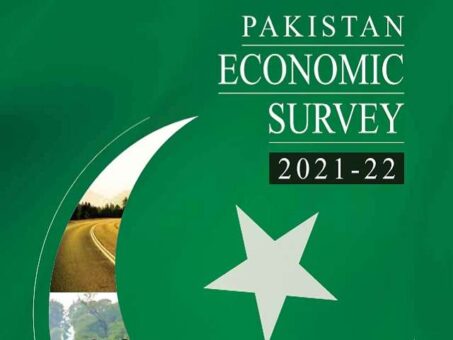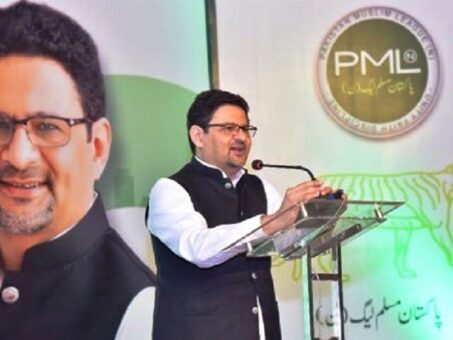SINGAPORE: Moody’s Investors Service on Thursday June 2, 2022 affirmed the Government of Pakistan’s B3 local and foreign currency issuer and senior unsecured debt ratings, the (P) B3 senior unsecured MTN programme rating, and changed the outlook to negative from stable.
A statement issued by the Moody’s stated that the decision to change the outlook to negative is driven by Pakistan’s heightened external vulnerability risk and uncertainty around the sovereign’s ability to secure additional external financing to meet its needs.
Moody’s assesses that Pakistan’s external vulnerability risk has been amplified by rising inflation, which puts downward pressure on the current account, the currency and – already thin – foreign exchange reserves, especially in the context of heightened political and social risk.
“Pakistan’s weak institutions and governance strength adds uncertainty around the future direction of macroeconomic policy, including whether the country will complete the current IMF Extended Fund Facility (EFF) programme and maintain a credible policy path that supports further financing,” it added.
The decision to affirm the B3 rating reflects Moody’s assumption that, notwithstanding the downside risks mentioned above, Pakistan will conclude the seventh review under the IMF EFF programme by the second half of this calendar year, and will maintain its engagement with the IMF, leading to additional financing from other bilateral and multilateral partners.
In this case, Moody’s assesses that Pakistan will be able to close its financing gap for the next couple of years. The B3 rating also incorporates Moody’s assessment of the scale of Pakistan’s economy and robust growth potential, which will provide the economy with some capacity to absorb shocks.
These credit strengths are balanced against Pakistan’s fragile external payments position, weak governance and very weak fiscal strength, including very weak debt affordability.
The B3 rating affirmation also applies to the backed foreign currency senior unsecured ratings for The Third Pakistan International Sukuk Co Ltd and The Pakistan Global Sukuk Programme Co Ltd. The associated payment obligations are, in Moody’s view, direct obligations of the Government of Pakistan.
Concurrent to today’s action, Pakistan’s local and foreign currency country ceilings have been lowered to B1 and B3, from Ba3 and B2, respectively. The two-notch gap between the local currency ceiling and sovereign rating is driven by the government’s relatively large footprint in the economy, weak institutions, and relatively high political and external vulnerability risk.
The two-notch gap between the foreign currency ceiling and the local currency ceiling reflects incomplete capital account convertibility and relatively weak policy effectiveness, which point to material transfer and convertibility risks notwithstanding moderate external debt.
Moody’s expects Pakistan’s current account to remain under significant pressure, on the back of elevated global commodity prices through 2022 and 2023.
Pakistan’s current account deficit has widened to a cumulative $13.8 billion since the start of the current fiscal year in July 2021 up until April 2022, compared to a deficit of $543 million in the same period a year earlier.
In the absence of an equivalent inflow in the financial account, the rapid widening of the current account deficit has led to a large drawdown of the foreign exchange reserves.
According to data from the IMF, Pakistan’s foreign exchange reserves have declined to $9.7 billion at the end of April 2022, which is sufficient to cover less than two months of imports. This compares with the $18.9 billion of reserves at the end of July 2021.
Moody’s projects the current account deficit to come in at 4.5-5 per cent of GDP for fiscal 2022 (ending June 2022), slightly wider than the government’s expectations. As global commodity prices decline gradually in 2023 and as domestic demand moderates, Moody’s expects the current account deficit to narrow to 3.5-4 per cent of GDP. Moody’s current account deficit forecasts are higher than previous (early February 2022) projections of 4 per cent and 3 per cent for fiscal 2022 and 2023, respectively.
The larger current account deficits underscore the need for Pakistan to secure additional external financing, especially given its very low foreign exchange reserves. Pakistan is in negotiations with the IMF on the seventh review of the EFF programme. Moody’s expects Pakistan to successfully conclude the review by the second half of the year, with the associated IMF financing to be disbursed then. Conclusion of the seventh review, and further engagement with the IMF, will also help Pakistan secure financing from other bilateral and multilateral partners. In this scenario, Moody’s expects Pakistan to be able to fully meet its external obligations for the next couple of years.
However, Moody’s assesses that the balance of risks is on the downside. An agreement with IMF could take longer than expected, as the government may find it difficult to reduce fuel and power subsidies given rising inflation. Recent moves by the government to raise fuel prices signal its commitment to addressing issues raised by the IMF. Still, political and social challenges will complicate the government’s efforts to agree on and implement further reforms, such as revenue raising reforms. While not Moody’s baseline scenario, if Pakistan is unable to secure additional financing later this year, foreign exchange reserves will continue to be drawn down from already very low levels, increasing the risk of a balance of payments crisis.
The Moody’s stated Pakistan’s rising external vulnerability risk has been amplified by rising inflation, particularly in the context of heightened political and social risks. In April 2022, inflation reached 13.4 per cent year-on-year, with particularly high inflation in food and energy which account for a very large share of the most vulnerable households’ budgets.
Moody’s assesses that political uncertainty in Pakistan remains high, even after the new government has been installed. The new ruling coalition comprises of multiple political parties with divergent interests, which is likely to make the enactment of any legislation difficult, including those related to reforms under the IMF EFF programme. Moreover, the next elections are due by the middle of 2023. In Moody’s view, political parties will find it difficult to continually enact significant revenue-raising measures in the run-up to the elections, especially in a high inflation environment.
Rising interest rates are also likely to increasingly constrain the government’s policy choices, especially since interest payments already absorb more than 40 per cent of revenue.
Meanwhile, domestic political risk has also risen with a higher frequency of terrorist attacks over the last year. According to the Pak Institute for Peace Studies think-tank, the number of terrorist attacks increase 42 per cent in 2021 compared to a year ago. More frequent terrorist attacks add to safety concerns, which may increase social risks, as well as constrain business conditions and limit investment.
Moody’s assesses that there is a material probability of a recurrence in domestic political stress that will impinge on the effectiveness of policymaking and the government’s ability to implement timely economic reforms aimed at achieving macroeconomic stability.
The affirmation of the B3 rating reflects Moody’s assumption that Pakistan will secure external financing, including through the conclusion of the seventh review and subsequent reviews under the IMF EFF programme and avoid a balance of payment crisis.
Pakistan’s B3 rating also reflects Moody’s assessment that the country’s large size and robust potential growth provides it with some capacity to absorb economic shocks. Pakistan’s potential growth of about 5 per cent in part reflects the country’s favourable demographics with its sizable under-30 population. Nonetheless, Pakistan’s potential growth is constrained by structural challenges, including weak governance and weak competitiveness.
Moody’s projects Pakistan’s real GDP growth to slow to 4.2 per cent in fiscal 2023, moderately lower than the government’s projections. This compares with growth of 6.0 per cent in fiscal 2022. The moderation in economic activity reflects the drag on domestic demand from rising inflation and a tightening in monetary policy by the State Bank of Pakistan. Moody’s expects Pakistan’s real GDP to pick up gradually reaching 4.5-5 per cent over fiscal 2024 and 2025.
Meanwhile, Pakistan’s fiscal strength is very weak, a long-standing feature of the sovereign’s credit profile. Moody’s expects fiscal consolidation to stall ahead of the next general elections. Moody’s projects Pakistan’s government debt to stabilise at around 70 per cent of GDP for fiscal 2022 and 2023, higher than the median of 63 per cent for B-rated sovereigns.
Meanwhile, given a very narrow revenue base, Pakistan’s government debt as a share of revenue is very high at around 560 per cent in fiscal 2021. Moody’s expects this ratio to remain elevated at 550-590 per cent over fiscal 2022 to 2024, well above the 290 per cent for the median B-rated sovereign. As mentioned, the sovereign also has very weak debt affordability – one of the weakest among Moody’s rated sovereigns.
READ MORE: Moody’s changes Pakistan’s rating to stable from negative





